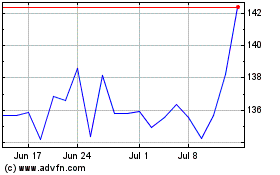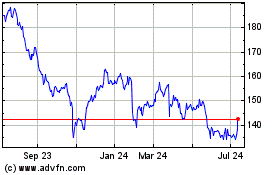By Paul Page
Sign up: With one click, get this newsletter delivered to your
inbox.
The marketplace for logistics companies appears to be open
again. New mergers and acquisitions deals are percolating, a sign
that stagnant shipping demand in recent month is pushing some
companies to seek tie-ups to build scale and new business coverage,
WSJ Logistics Report writes. The talks follow a wave of
consolidation last year that involved some of the logistics world's
biggest operators, including United Parcel Service Inc., FedEx
Corp. and XPO Logistics Inc. Middle-market companies appear to be
in the market this year, with logistics firm BDP International Inc.
and freight forwarder Pilot Freight Services both said to be
targeted by prospective buyers. Chicago-based Hub Group Inc. is on
the other side, looking to add to its intermodal and truck-focused
portfolio. The buyers are hoping the purchases lead to another kind
of consolidation -- with shipping customers buying bigger packages
of logistics and transport service.
Cuba's famous tobacco industry is nowhere near ready to light up
over the prospect of reaching the world's largest cigar market. A
close look at the island nation's storied tobacco farms shows a
business that's grown fallow after 50 years under communist rule,
the WSJ's Tripp Mickle reports. Despite fertile soil that yields
slow-burning tobacco that is the envy of the world, Cuba's supply
chain in its most famous industry appears broken. Cuba's cigar
exports are falling and cultivation plummeted 65% between 2009 and
2014.State-owned Tabacuba wants to boost production, but farmers
say big changes are needed. They say they are poorly supplied from
government-supported cooperatives and the government, which buys
all the tobacco farmers grow, pays too little in relation to other
crops. Opening trade with the U.S. would surely boost demand, but
it may take a long time for the supply side of the trade to catch
up.
Panasonic Corp. wants to buy its way into a bigger role in the
automotive supply chain . The Japanese electronics giant is looking
at acquisitions over the next two years aimed at making the company
a force in new technologies going into automobiles, the WSJ's Yuka
Koshino reports. The strategy is part of the upheaval in the auto
parts business, with companies rushing to capitalize on the
computerization of cars and the interest in autonomous technology.
Big auto makers and tech companies have struck deals for
collaboration, and there's more talk about consolidation among
suppliers. Panasonic already provides batteries to power Tesla
Motor Inc.'s electric vehicles and is developing driver-assistance
systems, so its interest in buying in new technology could lead
competing suppliers to line up their deals in response.
TRANSPORTATION
The merger of Germany container-shipping operator Hapag-Lloyd AG
and Dubai-based United Arab Shipping Co. could be done by the end
of the summer. UASC's shareholders -- which include the governments
of Qatar, Saudi Arabia, Kuwait and the United Arab Emirates -- will
meet next week to consider the deal that would create the world's
fifth-biggest container line, the WSJ's Costas Paris reports. It's
the latest by shipping lines to consolidate their operations amid
an industry's arms race over costs, capacity and prices that's
being fought with increasingly large vessels. That leaves only the
fate of South Korea's two carriers still to be resolved in the
shipping world's turbulent restructuring, with both Hanjin Shipping
Co. Ltd. and Hyundai Merchant Marine Co. Ltd. still trying to reset
their debt-laden finances.
U.S. manufacturers that sell largely to domestic markets are
doing increasingly better than those that depend on exports. The
split conditions, seen throughout new earnings reports and gauges
of U.S. factory activity, reflect the weight of a strong dollar and
tensions in the global picture weighed down by troubled commodities
markets and faltering national economies. Domestically-oriented
U.S. manufacturers are faring better, with steadier business buoyed
by the relatively brighter auto, housing and job markets, the WSJ's
Lisa Beilfuss reports. Caterpillar Inc. is among the companies
seeing business struggle abroad, yet Chief Executive Douglas
Oberhelman in the U.S., "just about any market that's away from oil
is doing pretty good." Consumers are increasingly confident, and
smaller manufacturers with shorter, regional supply chains are
reflecting the shift in greater hiring and stronger earnings.
QUOTABLE
IN OTHER NEWS
A new report details the projected winners and losers among U.S.
industries from the proposed Pacific trade agreement. (WSJ)
Germany's Bayer AG will make a $62 billion offer to acquire
Monsanto Co. in a deal that would create the world's largest
agrochemicals company. (WSJ)
Vietnam's VietJet Aviation JSC has signed an $11.3 billion deal
to buy 100 passenger jets from Boeing Co. (WSJ)
Sales of existing homes rose 1.7% in April, with faster growth
in more affordable regions like the Midwest. (WSJ)
General Motors Co. is ending production of its Cadillac ELR
electric vehicle after the luxury coupe failed to connect with
consumers. (WSJ)
Mexico's economic growth accelerated to 0.8% in the first
quarter, including 1.2% expansion in industrial production.
(WSJ)
Retail sales in Canada fell 1% in March. (WSJ)
Hanjin Shipping Co. Ltd. bondholders gave the financially-ailing
container ship line a four-month extension on debt obligations.
(Yonhap)
Amazon.com Inc. notified retail customers it will raise
fulfillment services prices during the fourth-quarter holidays.
(Internet Retailer)
Amazon will hold nearly 20% of the U.S. retail apparel market by
2020, according to Morgan Stanley. (Sourcing Journal)
Amazon appears to be preparing to add a distribution center in
Twinsburg, Ohio, in between Cleveland and Akron. (Cleveland
Plain-Dealer)
Retailer J.C. Penney is testing a plan to sell Ashley Furniture
by having the supplier handle all inventory and distribution.
(Journal of Commerce)
FedEx Ground will place a new regional distribution hub outside
Allentown, Pa. (Lehigh Valley Live)
DB Schenker will open a logistics center in northeastern China
in a joint venture with Jinbei Automotive. (Stat Times)
Pasha Automotive Services will manage a San Francisco Port cargo
terminal under a port plan to draw more automotive import and
export trade. (Automotive Logistics)
The United Auto Workers union wants to organize workers at the
Tesla Motors Inc. car factory in California. (USA Today)
Leaders in the U.K.'s trucking industry are divided on whether
the country should leave the European Union. (Motor Transport)
Air India agreed to pay $12.5 million to settle an airfreight
suit over price fixing, the last target of the decade-old suit to
settle. (Air Cargo News)
CMA CGM SA will seek nearly $1 billion in cost savings after
reporting a $100 million net loss in the first quarter.
(Reuters)
New York City will pay $14 million to settle a suit over parking
tickets given to commercial delivery trucks. (New York Daily
News)
ABOUT US
Paul Page is deputy editor of WSJ Logistics Report. Follow him
at @PaulPage, and follow the entire WSJ Logistics Report team:
@brianjbaskin, @lorettachao, @RWhelanWSJ and @EEPhillips_WSJ, and
follow the WSJ Logistics Report on Twitter at @WSJLogistics.
Subscribe to this email newsletter by clicking here:
http://on.wsj.com/Logisticsnewsletter .
(END) Dow Jones Newswires
May 23, 2016 06:43 ET (10:43 GMT)
Copyright (c) 2016 Dow Jones & Company, Inc.
United Parcel Service (NYSE:UPS)
Historical Stock Chart
From Mar 2024 to Apr 2024

United Parcel Service (NYSE:UPS)
Historical Stock Chart
From Apr 2023 to Apr 2024
